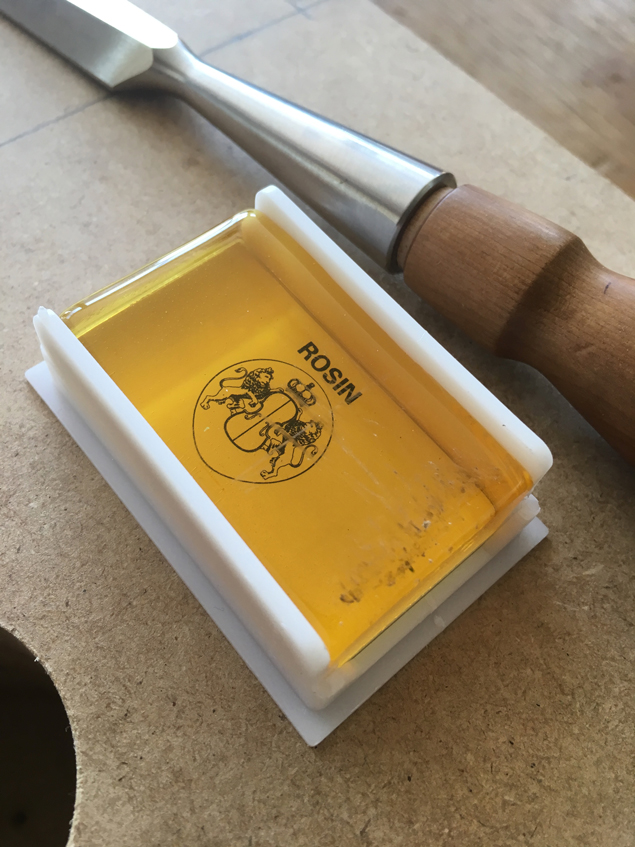We may receive a commission when you use our affiliate links. However, this does not impact our recommendations.
 Woodworkers use waxes (and other things) to decrease friction, but what about when we want to increase friction? Lately I’ve been trying inexpensive rosin – intended for the bows of stringed instruments – with excellent results.
Woodworkers use waxes (and other things) to decrease friction, but what about when we want to increase friction? Lately I’ve been trying inexpensive rosin – intended for the bows of stringed instruments – with excellent results.
Rosin is a byproduct of heating tree sap to make turpentine or a variety of other products and has a variety of uses in industry and the arts – everything from ballet dancers to bull riders to machinists. (Check out a list of its uses here.)
Woodworker and toolmaker Raney Nelson turned me onto rosin several months ago. I purchased two small blocks from an instrument supply store and have found a great many uses for it.
- Apply it to the wooden tenon of a socket chisel to increase its grip in the metal socket (common hairspray also works).
- For mallets that disassemble, a little rosin on the handle’s tenon makes the joint hold together better.
- A thin coat on hex bits help keep them in place when driving screws.
- A few wipes on the fence bars of your plow and rabbet planes helps keep the fence from sliding around.
- Rub it on the wedge of your wooden plane to help the wedge stick a little tighter.
- And on and on. Anything that needs to stay put can use a little rosin.
The only downside to the rosin is that it’s a bit fragile at room temperature, so it’s easy to splinter and crack. And if you put too much on? Apply mineral spirits and you are back to where you started.
My little block of rosin has earned a place in my tool chest, proving once again that trees try to give us everything we need.
— Christopher Schwarz
Here are some supplies and tools we find essential in our everyday work around the shop. We may receive a commission from sales referred by our links; however, we have carefully selected these products for their usefulness and quality.









I’ve used a bag of powdered sports rosin for years.
As an aside, I am in possession of a blob of rosin that was a byproduct of one of the many turpentine distilleries that dotted the pine woodlands of the southeast. I was hunting and had stopped to have lunch near some ruins. I followed an old pipe that extended out over a nearby depression in the ground and noticed a glint of sunlight off something below the end of the pipe. It looks like bright orange glass and weighs over four pounds. It now occupies a space in my shop where it always gets a, “What the heck is that?” from visitors. I didn’t get my buck that day but I sure found a trophy.
From time to time, I use rosin on the upper pulley of my treadle lathe. Reduces belt slippage. Increases torque. Cures the common cold.
I’m sorry for being “that guy,” but here’s some information from the trade.
Non-musicians might be stymied by the different types of rosin–violin/’cello/bass. Two string player pals confirmed what I suspected; violin and ‘cello rosin is more or less the same. Bass rosin is noticeably tackier. In other words, don’t panic when searching on line or checking at the local music store. Shop price.
Again, my apologies.